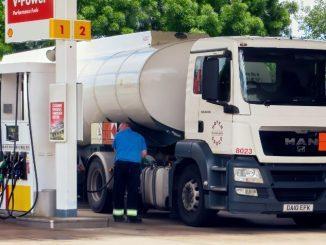
If the logistics sector is to meet decarbonisation targets the government must maintain its freeze on fuel duty, Logistics UK warned this week.
The call comes ahead of the 2021 Spending Review, which will conclude next week (27 October 2021) alongside the Autumn Budget - one of the most important in the UK’s post-war history, according to Logistics UK.
David Wells, chief executive said: “With our industry’s revenues still returning to normal after the economic shut down, and logistics businesses already operating on incredibly narrow margins, there is simply not the cash available to fund investment in new technologies as well as paying any additional charge on fuel.
“At present, diesel is one of the single biggest running cost in operating a large fleet of HGVs: our own research indicates it accounts for more than 30% of an HGV’s operating cost and is a commodity which our members simply cannot do without.
“Any duty rise would do nothing to help our sector switch to new, alternatively fuelled vehicles, and would simply slow the industry’s rate of recovery at a time when logistics businesses are already under intense financial pressure.”
He pointed to how hauliers had kept the country’s supermarket shelves stocked through the pandemic adding: “An increase in fuel duty would directly impact those companies at a time when they are starting to get back on their feet and starting to plan for a cleaner, greener future.”
Read more
- Freeze fuel duty forever to help green transition, says Logistics UK
- Tory pre-election pledge to freeze fuel duty welcomed by FairFuelUK
- Fuel duty freeze a victory over ill-informed green lobby, insists FairFuelUK
Logistics UK has been calling for a freeze on all fuel duty until diesel trucks are phased out in 2040, to give businesses time to plan and make the necessary investment in alternatively fuelled vehicles.
“The logistics sector is committed to a net zero future, but to achieve this, needs a stable income stream to make the investments needed in vehicles and infrastructure. A fuel duty hike would do nothing to help our sector on the road to recovery and would make it even harder for our members to achieve their Net Zero ambitions. It would be nothing more than a direct tax on our sector’s ambitions to achieve Net Zero.”
Elizabeth de Jong, director of policy at Logistics UK, added: “Given the impacts of Covid-19 on our economy and challenges to public finances, there have been few Spending Reviews in the post-war period more important than this one.
“That is why Logistics UK has made a full and thorough submission to HM Treasury, detailing all of the areas which we believe require government investment in order for the logistics sector to play its vital role underpinning economic activity in the UK.”
Logistics UK is calling for:
• Transport infrastructure spending to improve roads and facilities
• Large-scale testing of alternative fuels to help deliver the government’s Transport Decarbonisation Plan
• Investment in the UK’s borders through IT systems and staffing
• Support for private sector investment in warehouses, ports and airports
• Government action to enhance the electricity supply
• Support for large-scale demonstration projects














